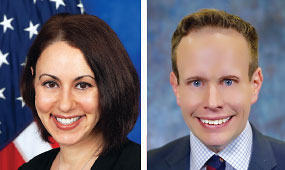Understanding the Mental-Dental Health Connection Said to Be Integral to Patient Care
Abstract
Psychiatrists well understand the need to be aware of all of their patients’ health issues, but sometimes oral health gets overlooked. This is the first of a two-part series.

The impact of oral health conditions upon individuals experiencing psychiatric disorders is a key concern for both clinicians and public health professionals. A 2022 study by Tamanna Tiwari, M.P.H., and colleagues in Frontiers in Oral Health suggested that individuals who reported “poor mental health were more likely to be facing financial and emotional hardships and were more likely to have had COVID-19.” Poor oral health was “associated with poor mental health, age, socioeconomic status, and not visiting the dentist at regular intervals.” Tiwari and colleagues also reported that “over 65% of the respondents who endorsed poor mental health reported doing nothing about their oral health symptoms.”
Aside from the COVID-19 pandemic, fear of judgment, financial factors, anxiety related to medical procedures, and poor self-concept influence decreased oral care utilization by those with mental illness. Poor oral health can result in tooth loss and compromised speech and esthetics, adversely affecting self-esteem, socialization, and occupational engagement. Chronic oral pain is a stressor that can decrease serotonin levels, rendering the management of depression and anxiety more difficult. The social and biological impacts of untreated oral diseases often work cyclically to worsen oral, mental, and overall health.
What can psychiatrists and public health professionals do to enhance oral health outcomes for individuals experiencing mental disorders? First, all should be aware of oral conditions commonly seen in association with these disorders. Four key conditions that are observed in patients with psychiatric disorders are tooth decay, gum diseases, dry mouth (xerostomia), and bruxism (tooth grinding).
Tooth decay typically occurs when individuals frequently consume foods rich in fermentable carbohydrates. Frequent consumption of these carbohydrates allows them to remain in frequent contact with the teeth, where bacteria can convert them into acids that can damage the enamel and ultimately tooth dentin. Untreated, tooth decay can enter the pulp and lead to severe pain and abscesses. The latter can spread to the brain or chest cavity, resulting in the need for urgent medical interventions.
Additional Resources
The Smiles for Life National Oral Health Curriculum is a valuable resource for both physicians and public health professionals who wish to explore the topics in this article in more depth. Modules exist for a range of professionals, including international development professionals, frontline health workers, and medical educators. Further, many of the modules carry continuing education credit for physicians, dentists, nurses, pharmacists, and others. The Smiles for Life curriculum is posted here.
The American Dental Association and National Council of Mental Wellbeing has developed a toolkit that provides a comprehensive set of resources to health care professionals and organizations that wish to coordinate or integrate oral, behavioral, and substance abuse care into their regular patient care. “Oral Health, Mental Health, and Substance Abuse Treatment: A Framework for Increased Coordination and Integration” is posted at here.
Gum diseases occur on a spectrum that ranges from gingivitis to periodontitis. The latter is of concern because it leads to the loss of supporting bone and soft tissue attachments around the teeth. Ultimately, teeth may be lost and require replacement. Worsening of periodontitis is associated with several conditions observed in psychiatric populations, including tobacco and cannabis use, diabetes, and poor nutrition. Studies have demonstrated a bilateral relationship between diabetes and periodontitis in that treatment of periodontitis can preserve the teeth and enhance glycemic control.
A key factor that often drives tooth decay and gum disease is xerostomia. Dry mouth is often seen as a side effect of medications that exhibit anticholinergic effects, including many psychotropic medications. The risk of xerostomia is also greater with individuals who take multiple medications. Additionally, xerostomia may be observed as a complication of chronic anxiety. Saliva contains enzymes and antibodies that control bacteria that cause oral diseases and minerals that can repair damaged enamel. Patients that are experiencing xerostomia should be encouraged to use over-the-counter oral moisturizers and fluoride mouth rinses or toothpastes. Chewing xylitol gum can stimulate saliva flow and inhibit the growth of bacteria that cause tooth decay.
Bruxism is observed as a complication of stress, anxiety disorders, traumatic brain injury, and some psychotropic medications. Left unaddressed, it can damage the teeth, leading to pain and disfigurement. It may also damage the jaw joints (temporomandibular joint dysfunction), contributing to pain. Bruxism is treated by providing patients with occlusal guards and collaborating with their psychiatrists to address medication side effects and psychological factors.
Lastly, all individuals experiencing a mental disorder should be linked to a “dental home” for ongoing oral care. Individuals without dental insurance may be referred to nonprofit health centers or dental schools as these may provide free or low-cost services.
In engaging patients regarding oral health, psychiatrists should do so in an open-ended, nonjudgmental fashion and ask patients about any oral health concerns they may have and barriers they may be encountering to resolve them. ■




